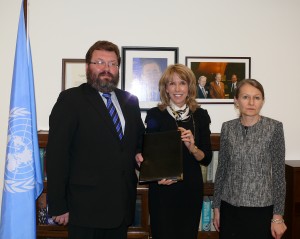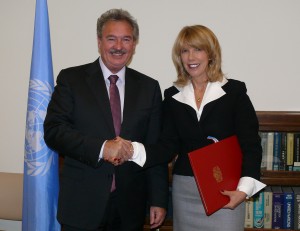

Our purpose: Promoting peace through criminal justice – preventing crimes of aggression
Through the United Nations Charter, States have expressed their commitment “to save succeeding generations from the scourge of war”. They have agreed to renounce the illegal threat or use of force, and to settle their disputes “by peaceful means in such a manner that international peace and security, and justice, are not endangered”. States have the legal duty to abide by this commitment and the UN Security Council has the primary responsibility to enforce it.The Nuremberg Trials made it clear that criminal justice also has an important role to play for the promotion of peace and the deterrence of acts of aggression – though it remained limited and theoretical for many decades thereafter. With the 2010 Kampala amendments to the Rome Statute of the International Criminal Court, States Parties created a new mechanism to enforce the most important rule of international law: the prohibition of the illegal use of force under the United Nations Charter. This website is dedicated to making accountability a reality.
News
 Workshop for African States Parties in Botswana – 15 & 16 April 2013
Workshop for African States Parties in Botswana – 15 & 16 April 2013
On the invitation of Botswana, Liechtenstein and the Global Institute for the Prevention of Aggression, Representatives from 26 African States Parties met in Gaborone, Botswana to discuss the ratification and implementation of the Kampala Amendments. The results of the workshop have been captured in a joint communiqué.
More details are available in the summary report of the workshop, available in English and French.
Statements were made by several high-level attendees including
- Ian Khama, President of Botswana
- Ban Ki-moon, Secretary General of the United Nations, message delivered by Zachary Muburi-Muita, head of the UN Office to the African Union
- Aurelia Frick, Minister of Foreign Affairs of Liechtenstein
- Dikgakgamatso Ndelu Seretse, Minister of Defence, Justice and Security of Botswana
- Andries Nel, Deputy Minister of Justice and Constitutional Development of South Africa
- Christian Wenaweser, Permanent Representative of Liechtenstein to the UN
Prince Zeid and Donald Ferencz speak on Aggression at Brandeis University: On 30 January 2013, Prince Zeid Ra’ad Zeid al Hussein, Permanent Representative of Jordan to the United Nations, and Donald M. Ferencz, Convenor of the Global Institute on the Prevention of Aggression, spoke at Brandeis University on the Crime of Aggression. The video of their talk has been posted on Youtube and is available below:
More information is available on the website of the International Center for Ethics, Justice and Public Life at Brandeis University.
 Estonia ratifies crime of aggression amendments: On 27 March 2013, Estonia deposited its instrument of ratification of the Kampala amendments with the Office of Legal Affairs of the United Nations. It becomes the fifth State Party to the Rome Statute, and the first Eastern European State, to do so. 25 additional ratifications are required for activation of the Court’s jurisdiction over the crime of aggression.
Estonia ratifies crime of aggression amendments: On 27 March 2013, Estonia deposited its instrument of ratification of the Kampala amendments with the Office of Legal Affairs of the United Nations. It becomes the fifth State Party to the Rome Statute, and the first Eastern European State, to do so. 25 additional ratifications are required for activation of the Court’s jurisdiction over the crime of aggression.
A press release is available on the website of the Estonian Foreign Ministry.
Photo: © Win Khine/United Nations
 Luxembourg fourth country to ratify aggression amendments: On 15 January 2012, Jean Asselborn, Deputy Prime Minister & Minster of Foreign Affairs of Luxembourg, deposited the instruments of ratification with the Office of Legal Affairs of the United Nations. Luxembourg is the fourth country to have ratified the Kampala amendments on the crime of aggression and on war crimes (article 8), following Liechtenstein, Samoa and Trinidad and Tobago. It is however the first ICC State Party that has both ratified the amendments and implemented them into domestic legislation. Luxembourg’s criminal code and its code of criminal procedure were already revised in February 2012. Now, after four ratifications, 26 additional ratifications are needed before the jurisdiction of the International Criminal Court over the crime of aggression can be activated.
Luxembourg fourth country to ratify aggression amendments: On 15 January 2012, Jean Asselborn, Deputy Prime Minister & Minster of Foreign Affairs of Luxembourg, deposited the instruments of ratification with the Office of Legal Affairs of the United Nations. Luxembourg is the fourth country to have ratified the Kampala amendments on the crime of aggression and on war crimes (article 8), following Liechtenstein, Samoa and Trinidad and Tobago. It is however the first ICC State Party that has both ratified the amendments and implemented them into domestic legislation. Luxembourg’s criminal code and its code of criminal procedure were already revised in February 2012. Now, after four ratifications, 26 additional ratifications are needed before the jurisdiction of the International Criminal Court over the crime of aggression can be activated.
Please see the Luxembourg Ministry of Foreign Affairs’ press release (in English and French) for more information.
Photo: Deputy Prime Minister and Minister of Foreign Affairs of Luxembourg Jean Asselborn deposits instrument of ratification with United Nations Under-Secretary-General for Legal Affairs Patricia O’Brien. ©United Nations/Win Khine
 German Parliament (Bundestag) approves ratification of Kampala amendments: The German Parliament’s lower house (Bundestag) unanimously approved the ratification of the Kampala amendments on the crime of aggression and on war crimes. The speakers in the debate stressed Germany’s historic legacy to prevent future crimes of aggression and thus favored a swift completion of the ratification process. One speaker highlighted the contribution of Liechtenstein and the Global Institute for the Prevention of Aggression. The ratification bill will now go to the upper house of Parliament (Bundesrat) and will then be signed by the President. The deposit of the ratification instrument at the United Nations is expected in early 2013. The full transcript of the reading in German is available here.
German Parliament (Bundestag) approves ratification of Kampala amendments: The German Parliament’s lower house (Bundestag) unanimously approved the ratification of the Kampala amendments on the crime of aggression and on war crimes. The speakers in the debate stressed Germany’s historic legacy to prevent future crimes of aggression and thus favored a swift completion of the ratification process. One speaker highlighted the contribution of Liechtenstein and the Global Institute for the Prevention of Aggression. The ratification bill will now go to the upper house of Parliament (Bundesrat) and will then be signed by the President. The deposit of the ratification instrument at the United Nations is expected in early 2013. The full transcript of the reading in German is available here.
Photo: © Bundestag/Lichtblick/Achim Melde
 President of Senegal announces ratification: At the opening of the 11th session of the ICC Assembly of States Parties in The Hague, the President of Senegal, Macky Sally, announced that his country will ratify the Kampala amendments on the crime of aggression. During the general debate, many other delegations stressed their commitment to ratify; these include Austria, Botswana, Chile, Croatia, Estonia, Germany, Luxembourg, Panama, Peru, Slovenia, Spain and Switzerland.
President of Senegal announces ratification: At the opening of the 11th session of the ICC Assembly of States Parties in The Hague, the President of Senegal, Macky Sally, announced that his country will ratify the Kampala amendments on the crime of aggression. During the general debate, many other delegations stressed their commitment to ratify; these include Austria, Botswana, Chile, Croatia, Estonia, Germany, Luxembourg, Panama, Peru, Slovenia, Spain and Switzerland.
Photo: President of Senegal, Macky Sally, speaking at the opening of the ASP in The Hague. ©ICC-ASP/Ikeda
 27 to go – Trinidad and Tobago ratifies crime of aggression amendments: On 13 November 2012, Trinidad and Tobago deposited its instrument of ratification of the Kampala amendments with the Office of Legal Affairs at the United Nations. Trinidad and Tobago is the third country that has ratified (after Liechtenstein and Samoa), 27 additional ratifications are still required for activation of the Court’s jurisdiction over the crime of aggression.
27 to go – Trinidad and Tobago ratifies crime of aggression amendments: On 13 November 2012, Trinidad and Tobago deposited its instrument of ratification of the Kampala amendments with the Office of Legal Affairs at the United Nations. Trinidad and Tobago is the third country that has ratified (after Liechtenstein and Samoa), 27 additional ratifications are still required for activation of the Court’s jurisdiction over the crime of aggression.
Photo: Ambassador Eden Charles and Ambassador Rodney Charles handing over the ratification instrument to Ms. Gabriele Goettsche-Wanli (Chief of the Treaty Section, OLA) ©United Nations
Germany starts ratification process in parliament: All political parties of the German Bundestag welcomed the swift ratification of the Kampala amendments on the crime of aggression and on article 8 (war crimes) at their first reading on 18 October 2012. Spokespersons stressed that the amendments are a judicial milestone in international law and a historic opportunity, in particular important for Germany due to its history. Further information, please see the following news article in German and the official record of the reading.
